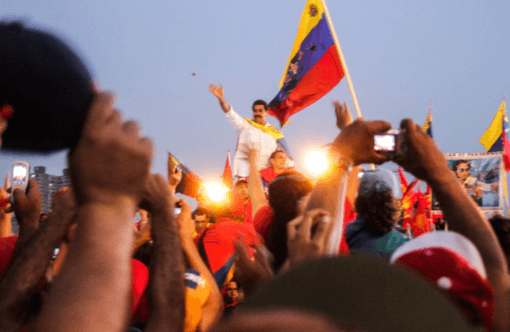
Photo by Joka Madruga | CC BY 2.0
This Sunday, on the 187th anniversary of Simón Bolívar’s death, grassroots leader Angel Prado voiced the concern that he and his supporters had been, like that historical figure, abandoned by the very state that they helped to build. The reasons for this worry are obvious: Prado, who is a popular Chavist candidate for mayor in the Simón Planas township, won a landslide victory on December 10 against the government’s candidate, only to see that victory taken away by decree.
Prado is a grassroots leader like few others. For the past decade, he has worked to develop El Maizal, one of Venezuela’s most emblematic and successful communes, which are key building blocks in the path to socialism as Chávez conceived it. El Maizal was visited by the late President at its inception in 2009, and today it produces 4000 metric tons of corn every year, alongside important quantities of meat and cheese.
To prevent mayor-by-decree Jean Ortiz from taking office, Prado’s supporters have spontaneously occupied Simón Planas’ central plaza. Their methods are peaceful: they broadcast loud patriotic music and their children play around the encampment. They speak of Prado’s victory as an expression of the “people’s will,” and say they won’t budge until they get a response from the government.
The case of Angel Prado and the township of Simón Planas is not unique. Now that the opposition has all but disappeared from view in Venezuela’s political panorama — in part because their violent tactics met with mass disapproval and in part because Maduro adopted most of their economic program — it is logical that contradictions among different Chavist tendencies should come to center stage.
In Caracas, alternative Chavist candidate Eduardo Saman, who was supported by the Communist Party (PCV), competed with the PSUV’s Erika Farías. Farías’ people played a dirty game, using overt clientelism to leverage voters and positioning party cadres around the poles to spread the rumor that her opponent had resigned. In this case, the unfair pressure on voters was unnecessary: Farías won by an ample margin because her opponent is little known, especially among younger voters.
Why does the government play so hard against Chavist alternatives, even against options that have emerged within the Chavist Polo Patriótico bloc that includes (together with the PSUV) PPT, Tupamaros, Redes and the Communist Party? One answer is that political culture in this country has been despotic and clientelist for at least a century. The United Socialist Party (PSUV) was constructed in a great hurry, and it reproduced many of the most problematic characteristics of this culture of power.
Yet the recent rise in hardball politics also relates to the political conjuncture. Governments and movements need unquestioning obedience when they are developing pacts with historical enemies that will damage their original bases. The Mexican PRI worked in the same manner during its move to the right that began in the 1940s, after Lazaro Cárdenas’ presidency. In Venezuela, negotiations with the political opposition and generous concessions made to the local capitalist class speak for a similar “right turn” taking place under our noses.
The last year in Venezuela has seen the birth of mass organizations and projects such as Somos Venezuela and Plan Chamba Juvenil. The government has used these far from spontaneous movements to capture youth that knows little about the original impulse of the Bolivarian Revolution. Because of the dire economic situation, they are easily attracted by modest stipends. Along with other stipend programs, such organizations form the base of a new Chavism that the government feels it can count on for uncritical support, even when compromising with class enemies.
Chavists who want to oppose this kind of pact and preserve the original socialist project will need a great deal of political shrewdness. Contradictions with the governing group need to be downplayed, since this group has Chávez’s mark of approval and is also a bulwark against imperialism. Nor can the different popular and grassroots Chavist movements work alone. Instead, they will need to organize across Venezuela’s vast territory and build a solid alliance between both urban and rural revolutionary Chavism. Only then will this bloc be strong enough to maintain the course toward socialism.